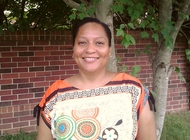|
By Michelle Vann Horton, See the Triumph Guest Blogger
Places of worship are often viewed as safe havens, a refuge for those in need. This perception has been no different for many immigrant victims who suffer from intimate partner violence. Many times, immigrants reach out to their religious leaders first before seeking professional sources of support. This sounds like a good idea, since religious institutions play a vital role in helping immigrants maintain their cultural identity and stay connected to others. Can we assume that religious leaders who shares a similar cultural background would be empathetic to immigrant victims of intimate partner violence? Unfortunately, in many cases, this is not what happens. In reality, many religious leaders react negatively or are unsupportive to victims of abuse. There are many reasons this may happen. First, many religions promote a harmful patriarchal point of view, which promotes male domination over women. From this lens, gender norms are established where sexual inequality is accepted and upheld in families throughout generations. Second, group-oriented cultural ideologies often prioritize the advancement of the community, family unit, or marriage over the wellbeing of the self. In addition, cultural definition and perceptions of intimate partner violence can vary greatly, and in many immigrant communities, these issues are not even acknowledged. Together, these cultural views can contribute to the negative reactions religious leaders may project as they silence victims or blame the victims’ behavior as cause for the violence (i.e., victim-blaming). Leaders may relay the message that it is the victims’ responsibility to stop the violence and imply that victims’ abuse results from their failing in their relationship with God. It is important for immigrant victims of family violence to surround themselves with multiple sources of support, especially people and organizations that have expertise with helping people impacted by violence and abuse. I know this may be easier said than done, especially with the overwhelming barriers immigrant populations face daily, like language barriers, discrimination, adjusting to mainstream culture, and lacking knowledge about U.S. laws and available support systems. Due to these barriers, it is vital that community agencies have the training and the staff needed to meet the culture-specific needs of the growing immigrant population in the U.S. Moreover, it is imperative that domestic violence agencies also connect with religious institutions and leaders that serve immigrant communities in order to become more proactive in removing the stigma associated with family violence, especially within places of worship. As agencies partner with religious institutions, religious leaders can increase their competence in supporting victims and survivors, as well as create community norms that promote safe relationships and families. In addition, prevention and educational programs can be implemented that honor and respect cultural norms while reframing the ideals of what a healthy marriage and family looks like. Ultimately, religious leaders have the power to confront controversial issues like family violence in their preaching and in their teachings. The ability to take a stand against family violence while at the pulpit sends a direct message to congregants that promotes survivors’ safety and holds abusers accountable. Comments are closed.
|
Archives
July 2024
CategoriesAll About Intimate Partner Violence About Intimate Partner Violence Advocacy Ambassadors Children Churches College Campuses Cultural Issues Domestic Violence Awareness Month Financial Recovery How To Help A Friend Human Rights Human-rights Immigrants International Media Overcoming Past Abuse Overcoming-past-abuse Parenting Prevention Resources For Survivors Safe Relationships Following Abuse Schools Selfcare Self-care Sexual Assault Sexuality Social Justice Social-justice Stigma Supporting Survivors Survivor Quotes Survivor-quotes Survivor Stories Teen Dating Violence Trafficking Transformative-approaches |
Search by typing & pressing enter



 RSS Feed
RSS Feed